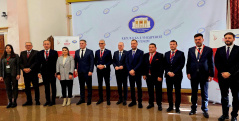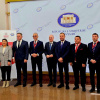MP Goran Milic, member of the National Assembly’s standing delegation to the South East Europe Cooperation Process Parliamentary Assembly (SEECP PA) took part in the meeting of the SEECP PA Standing Committee on 10 and 11 December 2024 in Tirana, under the auspices of the Albanian presidency of the SEECP PA.
The meeting was attended by delegations from Athens, Belgrade, Podgorica, Sarajevo, Skopje, Tirana and Zagreb, as well as a representative of the Regional Cooperation Council. The meeting was opened by Albanian Minister for Europe and Foreign Affairs Igli Hasani, who presented the priorities of the Albanian presidency for the period July 2024 to July 2025.
In his address on “Parliamentary Cooperation for the Advancement of Regional Interconnection and Facilitation of Cross-Border Trade in South East Europe” Goran Milic stressed that the National Assembly has for years been taking active part in the meetings of the South East Europe Cooperation Process Parliamentary Assembly with the wish to contribute to the advancement of economic cooperation and achievement of peace and stability in the South East European region. He added that there is room to further improve the mutual relations between the participants, for them to gain momentum and result in concrete forms of project cooperation that will directly affect the improvement of lives of our citizens. He stressed that the reasons that encourage multilateral cooperation in South East Europe in recent times stem, above all, from the interests of the region itself: the need to get closer to the European Union and the need for the neighbours to depend on one another due to the limitations of national markets, their economic power, development of infrastructure, use of common resources and the regulation of social and economic issues. He emphasised that as a region, we must remain vigilant and responsible, accept new realities, and cooperate as sincere partners, bearing in mind the seriousness of the geopolitical situation, the scale of the challenges and the need for adequate responses to the crises we face. He said that we must be aware of our responsibility and the need to find answers to current challenges through a coordinated approach, the first step in that direction being political will, which must be accompanied by concrete activities and measures.
Milic went on to say that Belgrade remains determined to resolve all outstanding issues through dialogue and in good faith - as a responsible and predictable partner and above all in accordance with the principles of international law. He stressed that it is important to become a region of high digital and technological development to be able to respond to the economic challenges of the 21st century and become a more competitive player in the global market, adding that all of this requires a joint response and the establishment of even more intensive regional cooperation. He stressed that Serbia supports the concept of establishing a Common Regional Market in the Western Balkans and added that significant progress has been made in creating a common regional market that meets EU standards, which paves the way for integration into the EU single market. He said that there is no doubt that regional cooperation in the Western Balkans has evolved a lot in recent years, that its effects are positive and that it increasingly reflects the interests of the region. He reminded that the above can best be seen through the abolition of roaming charges, travel and border crossing with ID cards, mutual recognition of diplomas and qualifications, employment opportunities and the like. He emphasised that it is clear that the countries of the region have recognised these effects and implemented them not only to fulfil the conditions for entry into the European Union, but as a benefit for all citizens of the region. He said that Serbia is sincerely interested in cooperation and closer regional connectivity through specific projects and measures, both in the field of infrastructure, and in trade, transport, energy and other areas, and that this is what will best present us as a region as a reliable partner in Brussels and directly contribute to faster integration into the EU. He reminded that the Republic of Serbia is the initiator of the "Open Balkans" initiative, which enables the free movement of people, goods, services and capital, as well as other large infrastructure projects that will improve the quality of life of all citizens of the countries participating in this initiative. He added that in this regard, work is also underway to build a new information system that will enable the citizens of Serbia, North Macedonia and Albania to work under the same conditions in all three countries, which means establishing a common labour market, as well as greater competitiveness of the three countries’ economies. He emphasised that this means creating a common future for the younger generations in the region. He said that deepening regional economic connectivity in the Western Balkans, the abolition of customs controls and other obstacles to free movement in the region, as well as the possibility of employment throughout the region, will contribute to the overall prosperity of the entire region. Finally, he emphasised that it is important to find ways to improve the existing and establish new cooperation mechanisms, as well as ways to overcome mutual disagreements, and reiterated Serbia's commitment to developing and strengthening friendly relations with the members of the SEECP while respecting the basic principles of peace, stability and prosperity.






